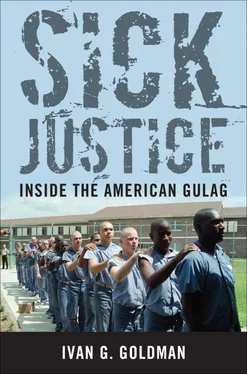Meanwhile, many states retooled their own statutes, using the harsher federal sentences as a model. Again, the discretionary power lost by judges flowed mostly to prosecutors.
Jed Stone, a defense lawyer who works in Waukegan, Illinois, noting that prosecutors sometimes seem to exist inside an intellectual enclave, said there’s a danger when individuals operate from an insular system in which “there is a failure to see the other side. You begin to view people as others. And when you begin to see people as other than you, they begin to become expendable.” Cutting corners to get convictions and piling on additional years can look like a correct course when the mind has fashioned an image of the defendant as a kind of subhuman target. When a person reaches such a mind state, he or she may view evidence that conflicts with a settled conclusion as having no bearing on the case. In Florida, for example, after DNA testing showed that the pubic hairs at the scene of a rape did not belong to the man convicted of the crime, prosecutors arguing against his appeal said that pubic hairs found on the victim’s bed could have come from movers who brought furniture to the bedroom a week or so earlier. “They essentially argued that there were naked movers,” said Nina Morrison, a senior staff lawyer in the national office of the Innocence Project. 14
Prosecutors who use such extreme means to attain questionable ends have lost their moral standing. Out on the street, they come to be viewed as just one more criminal gang. That raises the stakes for everyone—police, suspects, and everyday citizens, and society becomes more dangerous, which is precisely opposite to the desired outcome.
8
The Innocent and the Dead
IT’S HARD TO IMAGINE BEING IN THE SHOES OF A CONVICTED INNOCENT. TAKE the case of Timothy Cole. In 1986 Cole, twenty-six, an ex-soldier and student at Texas Tech, was positively identified by a student victim of a rape and robbery. After trial and conviction in Lubbock, Cole was sentenced to twenty-five years. He’d refused a plea bargain because he said he wouldn’t plead guilty to something he didn’t do. After his sentence was read, recalled his mother, Ruby Session, her son fell to the courtroom floor crying uncontrollably. She got off her chair and down on the floor with him, hugging and rocking him. She later said, “My son, a 26-year-old man, lying in his mother’s arms. And that’s all I could do. And that’s the last time my baby was in my arms like that.” 1
Performing hard labor surrounded by dust and pollen and sleeping in a poorly ventilated cell, Cole found his childhood asthma kick in during his sentence. Twice he was found unconscious and rushed to the emergency room. In 1992 he went before the parole board, but he refused to be contrite for a crime he didn’t commit, and parole was denied. His letters grew increasingly sorrowful and devoid of hope. In 1993 he wrote to his mother that his “only dream was to play in the NBA. That dream won’t ever come true. I don’t have any more dreams.” In a postscript, he told her, “I get to make phone calls every 60 days now.”
Several years after Cole’s trial, another Texas convict, lifer Jerry Wayne Johnson, began writing letters saying he’d committed the rape for which Cole was convicted, but he wasn’t sure who to tell or where to write, and no one with power paid any attention to his confession. In 2007 Cole’s mother found one of those letters, but it was too late. On December 2, 1999, Tim Cole had suffered chest pains and collapsed. He died at age thirty-nine. He’d essentially been slowly put to death.
Cole’s family found a lawyer with the Innocence Project who agreed to try to clear Tim Cole’s name. The group had known about Johnson’s confession earlier, but it was wary. Given its resources, the Innocence Project must be terribly selective in the cases it tries to clear. “We’ve had several of these guys,” the lawyer, Jeffrey Blackburn, said, referring to the occasional guilty convict who pleads guilty to someone else’s crime. “None of them have checked out.” In the Cole case, however, Blackburn discovered that the rapist’s semen was still in storage. DNA testing of the semen ruled out Cole as the perpetrator and found a complete match with Johnson.
In 2009 Governor Rick Perry proudly presided over the first posthumous pardon ceremony in Texas history. “Ruby,” he told Cole’s mother, “it means the world to me to be here today to look you in the eye and tell you that your son is pardoned.” A smiling Perry appeared to believe that the state’s criminal justice system had been vindicated along with Cole and that all was right with the world. Cole’s mother wasn’t so sure.
Reporter Beth Schwartzapfel, writing about the case for the online December 12, 2011, edition of Mother Jones , said, “The tale of Tim Cole and Jerry Johnson, which I investigated for more than a year, reveals a system in which an innocent man, once convicted, has virtually no chance of redemption—even with the guilty man fighting for it.” When convicts say something that conflicts with the official record, authorities generally dismiss it, saying you can’t accept a convict’s word as truth. But when convicts are testifying for the prosecution, they should most certainly be believed, especially if they reference a private, jailhouse confession that can’t be confirmed.
THE BLACKSTONE CREDO
Although he didn’t invent the idea, British jurist William Blackstone is remembered for declaring that protecting one innocent person from wrongful conviction is more important than jailing ten criminals. That credo, in one form or another, dates back thousands of years and is the foundation of the legal requirement that defendants must be proved guilty beyond reasonable doubt.
But what’s now generally known as the Blackstone ratio has been under attack in contemporary America, sometimes by stealth and sometimes with brutal frankness, as when syndicated columnist Jonah Goldberg pronounced it a mindless cliché. “If you want what’s right for somebody else simply because you’re afraid that you’ll be next,” Goldberg wrote, “then your motivations are selfish.” 2No matter how many times I read that sentence, it still doesn’t make sense. Although Goldberg would surely disagree, his argument stands on the shoulders of Feliks Dzerzhinsky, founder of the Soviet secret police, who famously professed, “Better to execute ten innocent men than to leave one guilty man alive.” 3Dzerzhinsky’s argument was straightforward and unadorned: he was insanely fixated on punishing the guilty no matter what the costs—and not afraid to show it. Madness is the only possible outcome for any system that values punishment over decency.
In his column, Goldberg, a leading conservative thinker, blithely made a case for rounding up the usual suspects and keeping them rounded up. “Better ten guilty men go free than one innocent be punished,” he contended, is no more than a silly slogan. “ Why is it better?” he asked, as though he’d stumped us. He closed off the debate with a time-tested technique—fear: “Maybe we will all accept it as the price of liberty when your mother is subsequently raped or your son is shot because, hey, better the rapists and murderers go free than the unlucky go to jail. But, it seems to me, there’s an argument to be had here.” 4
University of Michigan law professor Samuel L. Gross has argued that anyone trying to determine a proper innocence ratio against the percentage of rightful convictions is starting with a false premise. “No rate of preventable errors that destroy people’s lives and destroy the lives of those close to them is acceptable,” he concluded. 5
Perhaps if Goldberg were doing time for a crime he didn’t commit, he’d serve his sentence without a whimper for the greater good and to protect mothers everywhere from rape, but I expect he’d opt instead to yell his head off and lodge “selfish” complaints. In any case, Goldberg performed a service by audaciously spelling out what so many of his political and philosophical brethren believe in their heart of hearts: sending large numbers of suspects to prison, even if some are innocent, realistically means taking lawbreakers off the streets. After all, some of them are no doubt guilty of something, either offenses they’ve already committed or others they might perpetrate somewhere down the line. So isn’t it prudent to lock them up?
Читать дальше












